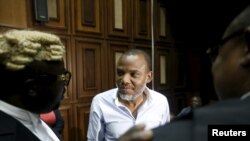In Nigeria, the trial of Biafran separatist leader Nnamdi Kanu will resume Tuesday, but the judge has ordered the proceedings to continue in secret, sparking further controversy.
When Nnamdi Kanu was arrested by secret police in Lagos in October 2015, nobody dreamed the affair would go on this long. He has been granted bail once, rearrested once and then remained in custody since then, despite court orders to release him.
Now there is another twist.
In December, Justice Binta Nyako granted the prosecution’s application asking the Kanu trial be held in secret. The charges against the Biafran separatist leader include criminal conspiracy and treason.
Protests in the southeast related to his detention have killed dozens of people, according to local rights groups.
Amnesty International said in November the military has sought to squash the movement, killing at least 150 pro-Biafra activists since August 2015. Police and security forces dispute that version of events, and have accused demonstrators of attacking them.
Witness protection
The state argues that witnesses in this trial need to be shielded from intimidation and violence.
Kanu’s lawyer, Ifeanyi Ejiofor, rejects the thought.
“They have the security to protect their witnesses," said Ejiofor. Why are they afraid? We are also talking about the fundamental human rights of the defendants who are being falsely accused. So we want to see the people coming to give evidence against them eyeball to eyeball. There should be no form of shielding. It is totally unacceptable to us and we cannot take it.”
Kanu was the head of Radio Biafra, a banned independent station that advocated for the restoration of the Republic of Biafra.
Talk of Biafra can strike a sensitive chord in Nigeria. The issue dates back to 1967 when Igbo separatists seceded. By the end of a civil war three years later, as many as two million people are believed to have been killed, many from starvation.
Despite this painful past, the issue of self-determination for the southeast has experienced a resurgence, though the movement denies any connection to violence.
“This is an intellectual fight," noted Emma Powerful, the spokesperson for the Indigenous People of Biafra. "We are not going to carry any arms. And God has been there for us. We are not going to be violent. It is going to be an intellectual war. We must go. Either Biafra or death!”
President Muhammadu Buhari, who fought on the government side in the Biafran war, has ruled out independence for the region. In a statement in December, he called on activists to “have a rethink.”
If convicted, Kanu could face the death penalty.




